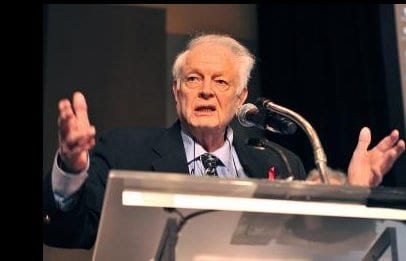Ontario’s AIDS community lost one of its most important advocates and leaders Jan 13 with the death of Jay Browne. Browne died from liver cancer at the age of 82. A social worker and former civil servant, he was one of the first people in Ontario to say publicly that “to fight HIV, we have to fight homophobia.” His memorial service was held last week in Burlington and was attended by more than 300 family, friends and people from the HIV community.
For close to 30 years Jay was involved in all aspects of HIV in Ontario. From the very beginning his work recognized that people living with HIV (whom he referred to as “heroes”) and other community activists had to lead the response. Although not a public figure, he was well known and respected by people involved in AIDS work.
His contributions were endless. In the late 1980s, Jay was the chair of the first advisory committee on AIDS, the Ontario Public Education Panel on AIDS (OPEPA) for the Liberal Ontario minister of health, Murray Elston. During this period he was a founding member of the Hamilton AIDS Network for Dialogue and Support (HANDS), which is now called The AIDS Network.
Shortly after, he became the AIDS coordinator for the Ministry of Health and Long-Term Care’s AIDS Bureau, which was started by then NDP minister of health Frances Lankin. Under his leadership, community funding was increased and stabilized, anonymous testing was initiated, and new HIV clinics were created in Toronto and Ottawa. In response to community activists and researchers, he started the HIV Ontario Observational Database (HOOD), which is now the OHTN Cohort Study, a groundbreaking study that monitors the health status of people with HIV in Ontario.
Through a precedent-setting contract related to AZT, he brought more than $10 million in research funds into Ontario. About 10 years ago, he came out of retirement briefly to help the Ontario HIV Treatment Network, a leading Canadian HIV research agency in Toronto, and he continued to be an important advisor to the OHTN staff and board until his death. About three years ago the OHTN amended its bylaws to make him an ongoing honorary member of the board of directors.
Over the last two years of his life, Jay volunteered to create Project Remember, a virtual time-line that commemorates the people and events that shaped the HIV movement in Ontario.
In an e-newsletter released last week, the OHTN said, “Jay will be remembered as one of the most kind-hearted, empathetic, and approachable people we have ever known. He personified generosity. He had time for everyone: he rarely said no and he always listened. At our staff meeting this morning, somebody said that if you met Jay for a mere 30 seconds, you’d remember him for the rest of your life. And a colleague wasted no time in pointing out that the opposite is also true; he would remember you.”
Deb Matthews, the Ontario minister of health and long-term care, said in a public letter addressed to Jay’s wife, Gina, and two sons Joe and Dillon, that Browne was “a man who rose to the occasion, held a genuine respect and compassion for his fellow human beings, recognized the depth of what was happening, and responded with a passion and commitment that remained with him for the rest of his life. That is a lesson in citizenship and humanity that we can all learn from.”

 Why you can trust Xtra
Why you can trust Xtra


